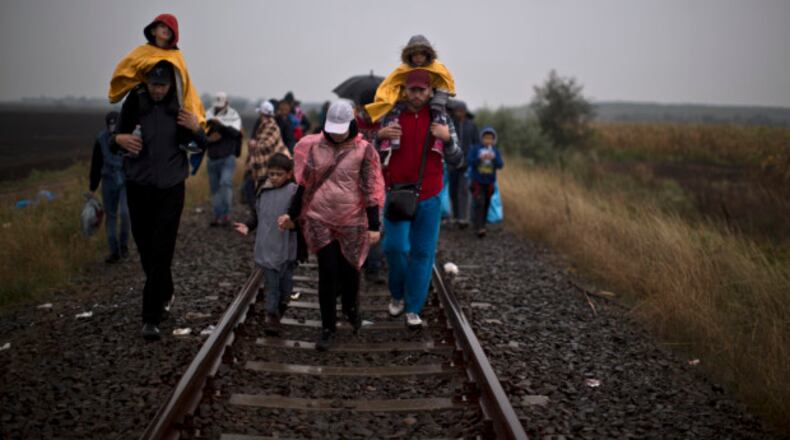Remember the Great Ebola Freakout way back in ... 2014?
Sure you do. It was just a year ago.
Remember the brave governors -- Georgia's own Nathan Deal prominent among them -- standing up to the federal government and pooh-poohing its reassurances that the threat of Ebola was easily contained?
Remember the media pundits and politicians who insisted that screening of airline passengers from West African destinations wasn't nearly sufficient, that the only way to protect ourselves from doom was to shut down all contact, to cancel all flights and ban all passengers from those areas, even if by doing so we severely hampered assistance efforts to those areas? Doing anything less, we were told, would turn us into victims of our own political correctness.
Remember intellectual giants such as Bill O'Reilly explaining to mere experts such as the head of the Centers for Disease Control (experts, what do they know?) that they were fools who had no idea what they were doing, that the panicked fearful had far more wisdom on the subject than those who had spent their entire adult lives studying and dealing with such challenges?
Remember how we were all GONNA DIE! Except, of course, we didn't. None of us did. Not a single person contracted the disease and died from it in this country.
Looking back on it, it all ought to be vaguely embarrassing. We also ought to have learned something from it. Yet here we are, a mere calendar year later, indulging ourselves in the Great Syrian Freakout of 2015, with almost identical dynamics. Only this time, it is not a disease that is our enemy. It is fellow human beings in their time of need.
In Washington, politicians are pandering to the worst of us, proposing and passing legislation that would contradict much of what we tell the world about ourselves and our values. Here in Georgia, the governor has issued an executive order attempting to block resettlement of all Syrian refugees, citing the recent terror attacks in Paris in which none of the attackers were Syrian.¹ Others, such as state Sen. Josh McKoon of Columbus, are even advocating a halt to all refugee resettlements in Georgia regardless of country of origin.
As a politician, such moments offer a test of character. Do you see irrational fear as an opportunity to be encouraged and then exploited for political gain, or do you treat it as as a problem that, as a leader, you have a responsibility to calm and overcome? Is that a moment at which we will be at our best, or our worst?
It's the kind of test by which history will judge a person, a state, a nation. It is also true of most religious faiths. At the moment that it mattered, when you had the capacity to help, did you live up to the principles that you claim to hold dear, or did you find a reason to do otherwise? Did you help the stranger in need, or did you pass him as he lay by the side of the road, afraid that by trying to help him we might endanger ourselves as well?
As our faith leaders remind us, it doesn't matter what words you utter sitting in a pew; what matters is what you do. By their fruits, you shall know them.
It's interesting that in general-- and there are certainly many exceptions -- those who most avidly preach American exceptionalism, the humanitarian importance of Judeo-Christian values and undying allegiance to principles such as religious freedom have been those most eager to toss all that aside in panic and pandering. While our European allies are trying to accept hundreds of thousands of largely unscreened refugees fleeing the violence sweeping their countries, we -- a nation of 300 million, a nation that we like to think of as more courageous -- cannot accept 10,000 carefully screened after a two-year process, and Georgia cannot accept a single one.
We shame ourselves. By our fear, we shame ourselves.
About the Author
The Latest
Featured



